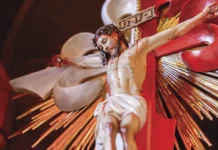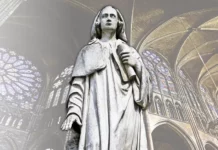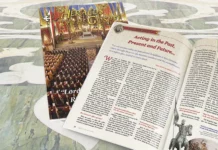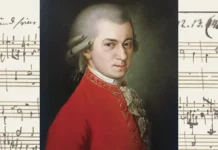Accompanied by the orchestra, the choir and six soloists perform Handel’s magnificent “Hallelujah” chorus. Now, just before the final bars, the concert hall is suddenly immersed in complete silence… Has there been a mistake in the execution of the piece?
Let us travel a little on the wings of imagination, and go back to the year 1743, March 23rd to be precise. We are situated at the Royal Opera House in London. There, a glorious performance awaits us: the premiere on English soil of George Friedrich Handel’s famous Oratory, Messiah.
Let us take a seat very close to the stage, or perhaps in one of the side balconies, for a better overview the ensemble. The audience around us is composed of nobility in glittering array. King George II himself honours the occasion with his august presence.
At a certain point in the production, the choir and the six soloists position themselves to perform, accompanied by the orchestra, the finale of the Oratory’s second part: the magnificent “Hallelujah” chorus. As it unfolds, the monarch stands in awe at the sublimity of the piece and is immediately imitated by the entire audience! This admiring attitude of the king will become an English tradition, followed to the letter in every presentation of the beautiful composition.
However, before the last bars resound, after the proclamation that the Lord will reign “for ever and ever”, the concert hall suddenly falls into complete silence… A flaw in the performance? No! It is only a strategic pause for a better appreciation of the final “hallelujah” of the work.
During that brief interlude, musicians and audience converge in a single sentiment of expectation, while they attentively await the gesture of the conductor, which will signal orchestra and singers to deliver the piece’s breath-taking conclusion.
Taking advantage of the “omnipotence” of imagination, let us freeze our curious journey at this precise moment preceding the glorious end of the piece, and use this moment of silence to briefly meditate…
Music: expression of sentiments and imponderables

Among the various artistic manifestations that civilizations have developed throughout history, music has, from the outset, always been one of the most eloquent.
Indeed, the variety of sounds, when well harmonized, is able to manifest what can only be perceived with the heart and is often not transmissible by words: certain sentiments and imponderables that dwell in the innermost regions of the human soul.
Thus, music is almost necessary for man. We ourselves, without realizing it, are more musical than we imagine. How often do we take pleasure or feel tranquillity in hearing certain melodies, or even, as the old adage goes, sing to chase away our sorrows when we are sad or troubled?
The most important celebrations of our life are usually linked to some song made famous over time. For example, there is no birthday without the traditional song Happy Birthday to You; the opening chords of Mendelssohn’s Wedding March are almost always heard at marriage ceremonies; and the famous Triumphal March of Verdi’s opera Aida often closes arduous years of study at solemn graduations.
But above all, music embellishes and solemnizes divine worship, preparing souls for contact with the supernatural world. If we pay attention to the feasts of the liturgical calendar, we see them marked by a melody that sums up the characteristic note of the season.
Thus, while the gentle and uplifting chords of Puer Natus and Stille Nacht pervade the atmosphere of Christmas, the grave and slow melodies of Parce Domine or Rorate invite us to penance during Lent and Advent. And at Easter time, the joys of the Resurrection unfold in joyful Alleluias, while the sublime notes of the Te Deum crown solemn thanksgiving celebrations.
Melodies that sum up graces and states of mind

Whether the composition is vocal or instrumental, music is also, in a very striking way, an expression of the cultural and spiritual progress of different peoples, reflecting their characteristic states of mind and mentality.
Gregorian chant is a case in point. Notably medieval, it was constantly present in monastic ceremonies and liturgical celebrations. And is it not true that, listening to it today, we feel enveloped by that austere sublimity so distinctive of the civilization of that time?
On the other hand, do not the joyful instrumental compositions of the late Middle Ages, like an Estampie or a Saltarello, convey to us something of that exuberant and innocent vitality which rejoiced in feeling close to God?
Now, with the passing of time, the development of music demanded new techniques from man, so that through them other aspects of the Creator could be transmitted. One of them consists in the use of an element overlooked by medieval composers and very little used in their arrangements: silence.
The symbolic power of moments of expectation
Incredible as it may seem, silence can produce admirable harmonies! Proofs of this are the compositions of the Creator of the universe himself!
If the reader has ever analysed the sounds of certain phenomena of nature, he may have had occasion to appreciate the musical analogies that God has placed in them. For example, the “symphony” of lightning has its first act in a beautiful flash, the lightning. This is followed by a brief silence which, similar to what takes place in a concert, announces the second and grandiose movement of the piece: the magnificent thunder!
This brief pause, which some enjoy subjecting to intriguing calculations and mathematical formulas, is in its own way as eloquent as the thunder, for it proclaims the lighting’s proximity. And it is curious to note that, in general, the longer and quieter the time before the thunder, the more we wish to hear it and the more violent and sonorous it appears upon arrival.
In this phenomenon, nature as a whole seems to hold back its splendour for a moment. Everything seems to bow in deep veneration before the Dominator of the Universe, whose implacable justice will then be symbolized by the thunder. From within this respectful and submissive “pause”, the storm blossoms into a wonderful explosion!
Medieval people certainly understood this symbolic aspect of silence, but they did not know how to use it in their compositions. Later, sensitive souls began to took advantage of it to confer upon music clearer reflections of divine majesty and justice, whose manifestations should be awaited with reverential expectation.
God’s silences throughout history
As eloquent as the melodies of an orchestra, these “symphonic silences” are an image of God’s way of acting in history: before beginning a great work, He pauses to prepare man’s heart to accept the imminent manifestation of His glory.
A quick glance at the unfolding of the centuries will enable us to perceive many divine “moments of quietude”, followed by a fulminating intervention.

This was what happened in the years before the flood, when men lived in ungodliness and Noah built the ark in their sight, foretelling the coming chastisement (cf. Gen 6:7).
Even during the erection of the Tower of Babel, God remained indifferent, as it were, waiting for men to carry out their perfidious plan, until finally He confused their languages (cf. Gn 11:1-9).
The supreme example was the most sublime silence in history: that which surrounded the Holy Sepulchre while the lifeless Body of Our Lord Jesus Christ lay in it. Profoundly sorrowful for the whole of creation, and above all for the Heart of His Most Holy Mother, this silence heralded the greatest victory of all time!
In this way, moments of silent expectation awaken hope in faithful souls and elicit beautiful acts of faith in them, while serving as a prophetic warning for sinners to convert and to prepare themselves for great divine operations.
Blessed are those who are able to love God’s imminent victory during the pauses that precede and seem to contradict it, for they will be worthy to share in the joys of its fulfilment!
What is our attitude in face of these “symphonic silences”?
Let us now return to our initial journey. We retake our positions among the distinguished audience of the Royal Opera House, and listen, still standing, as the final notes of the Hallelujah fill the hall with its grandeur.
The chords of this renowned composition are apt to transport souls into a victorious atmosphere, prefiguring perhaps a far superior and far more supernatural kingdom than that in which its composer lived.
Still pervaded by the impressions of such an unusual journey through time, we invite you, dear reader, to analyse a little this era in which we live. What part of the divine symphony of events are we currently witnessing? Are we not perhaps in the midst of one of those prolonged silences which precede truly glorious events?
We are undoubtedly living through calamitous days, marked by insecurity, abandonment of faith and chaos. And since the Lord is “God of vengeance” (Ps 94:1), He cannot but be ready to intervene, so that the world may be converted and receive the life of grace once again.

For our part, let us be attentive and vigilant, and not oblivious to the signs that are sent to us! The grand finale of Providence is about to conclude. Shall we be so foolish as to think that the “performance has ended” in these inglorious days, and turn away from the stage and the Divine Conductor?
So that incredulity and indifference do not take root in our souls, let us ask for the help of the Queen of Faith, the Most Vigilant Virgin, Mother of God and our own. She will enkindle our fervour and give us the courage to fight to the end for her Divine Son, for the Holy Church and for the establishment of the Kingdom of God on the face of the earth.
In this way, we will finally be worthy to stand by the side of the just souls, and to proclaim throughout eternity:
“Great and wonderful are Thy deeds, O Lord God the Almighty! Just and true are Thy ways, O King of the ages! Who shall not fear and glorify Thy name, O Lord? For Thou alone art holy. All nations shall come and worship Thee, for Thy judgments have been revealed” (Rv 15:3-4). ◊







